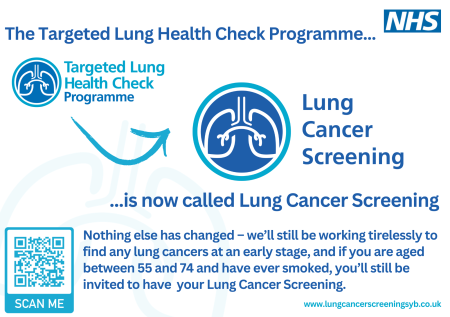
When Shakespeare famously wrote: “What’s in a name? That which we call a rose by any other name would smell as sweet,” he was suggesting that what something is named isn’t as important as the quality it provides. The Targeted Lung Health Check (TLHC) Programme is certainly proving to be of high-quality, with the aim of finding and treating lung cancer at a much earlier stage. In many cases, the treatment options include curing it.
But has the name of this screening programme – which will be a national screening programme by 2029 – not been as easy to understand as initially hoped?
As TLHCs launched in Sheffield last October – having invited eligible patients in Doncaster, Bassetlaw, Rotherham, and Barnsley since 2021 – the team continues to work hard raising awareness to increase people’s understanding of what TLHCs are all about, so they feel able to make a well-informed decision.
Clinical Director of the South Yorkshire and Bassetlaw (SYB) LCS Programme Dr Jason Page said: “We have invited more than 50,000 people across SYB since 2021 who met the criteria of being aged between 55 and 74 and having ever smoked.
“It’s incredible to be able to say we have found more than 600 cancers, and three-quarters of these were diagnosed at stage 1 or 2, which is exactly when we want to find it.
“Some people have asked what a TLHC is, not fully understanding it is to check for lung cancer.”
Research by NHS England’s Behavioural Insights Team (BIT) found that if people don’t understand or are confused about what a TLHC involves, they are more likely to not attend their appointment.
NHS England’s Behavioural Science Unit has worked with the Cancer Programme Team to investigate how changing the name could lead to people having a better understanding of TLHCs and so be more inclined to attend their appointments. From this came the recommendation to change the name of the programme nationally to Lung Cancer Screening.
Dr Page added: “Lung cancer often has no symptoms until it’s at a much later stage, and while we promote the signs and symptoms to look out for and to speak with your GP if you’re concerned, it cannot be said enough how important it is to take part in cancer screening when you are invited.
“If changing the name to Lung Cancer Screening means it will be clearer for people to understand and therefore be more likely to keep their appointments, it can only be a good thing. This screening programme is saving lives.”
For more information, please visit lungcancerscreeningsyb.co.uk